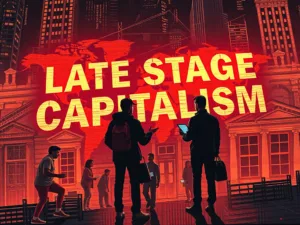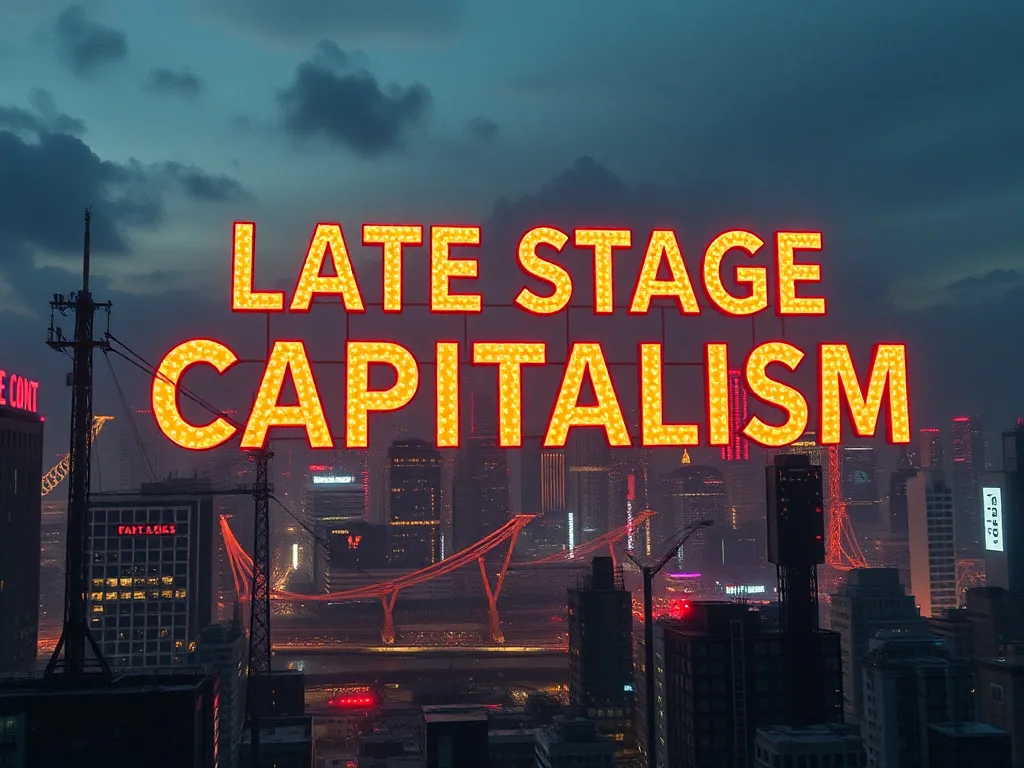The Dialectical Tensions of Decline
Introduction
Late Stage Capitalism describes an economic system nearing its limits, driven by contradictions it cannot reconcile. This stage creates existential threats not only for the U.S. but for global societies, ecosystems, and political systems. At this point, the structural forces of capitalism strain public welfare, environmental sustainability, and democratic institutions. As late stage capitalism permeates American politics and the world, it behaves like a virus, spreading destabilization and consuming resources critical for societal survival. We urgently need a “vaccine”—systemic reforms and global action to counter this condition and protect human welfare and planetary health.
Corporate Power and Late Stage Capitalism’s Influence
Corporate power shapes nearly every aspect of American and global life. Corporations wield influence traditionally reserved for governments, manipulating public policy and opinion worldwide. For example, the Citizens United

ruling allowed American corporations to funnel billions into political campaigns, shaping U.S. policy in ways that create ripple effects around the world (Gaughan, 2016). Corporate dominance here, and globally, exacerbates inequality, disrupting democratic processes and creating power structures that reinforce class divides.
In sectors like defense, U.S. corporations like Lockheed Martin exert influence over national budgets and priorities, distorting resource allocation in ways that impact global security and conflict (Hartung, 2021). Such corporate hegemony reshapes foreign policy, creating a world where profit often dictates humanitarian and security decisions.
Internationally, Big Pharma’s monopoly on essential medicines has led to global health disparities. The pharmaceutical industry’s grip over pricing and distribution exacerbates crises worldwide, as seen during the COVID-19 pandemic, when many countries struggled to access vaccines due to the high costs set by major U.S. and European pharmaceutical companies (Van Zee, 2009). This illustrates how late stage capitalism not only prioritizes profit over people but poses a global health risk.
The Gig Economy and Globalized Disposable Labor: A Symptom of Late Stage Capitalism
Late stage capitalism’s push for profit has globalized disposable labor, creating precarious working conditions across the world. Companies like Uber have transformed labor markets, outsourcing risks to workers worldwide

while retaining control over profits. This gig economy model, which emphasizes low wages and job insecurity, creates a class of workers who must accept precarious employment without social protections (Woodcock & Graham, 2019).
In Asia, Africa, and Latin America, companies profit from manufacturing practices that prioritize cost over safety. For example, the Rana Plaza collapse in Bangladesh, where over 1,100 garment workers died due to unsafe working conditions, reflects the global nature of late stage capitalism’s exploitation (Kabeer, 2014). Driven by global consumerism, multinational corporations maximize profits at the expense of labor rights and safety standards. This disregard for workers in low-income countries exemplifies late stage capitalism’s dehumanizing tendencies and reveals the global reach of economic exploitation.
Media Consolidation and the Control of Global Narratives
Media consolidation under late stage capitalism limits global access to diverse perspectives, enabling corporate control over narratives. Major conglomerates like Disney and Viacom-CBS dominate international media, narrowing public access to information worldwide (McChesney, 2004). These companies shape public opinion globally, fostering consumerism while stifling dissent. The consolidation of media has worldwide impacts, influencing political and social norms in countries beyond the U.S., often to the detriment of democracy.
Fox News, for example, has influenced conservative movements in countries like Brazil and the U.K., demonstrating how late stage capitalism can export narrow ideologies that support elite agendas. Global media consolidation also results in cultural homogenization, erasing local narratives in favor of profit-driven content that promotes the interests of multinational corporations (Benkler et al., 2018).
Environmental Degradation as a Global Catastrophe of
Late Stage Capitalism
Environmental degradation epitomizes late stage capitalism’s global impact. As corporations prioritize profits, they neglect ecological sustainability, intensifying climate crises worldwide. Companies like ExxonMobil, with operations spanning continents, drive up carbon emissions, exacerbating global warming and threatening ecosystems essential to human survival (Supran & Oreskes, 2017). The effects of these actions do not stop at national borders; instead, they destabilize climates, economies, and food supplies globally.
Deforestation in the Amazon, driven by corporate agriculture, demonstrates the global scale of capitalism’s environmental impact. This destruction not only erases biodiversity but also contributes to climate change, impacting vulnerable populations globally (Fitting, 2011). The globalized structure of late stage capitalism allows corporations to exploit resources and labor far from their origins, underscoring capitalism’s disregard for ecological boundaries and the well-being of the planet.
The Global Healthcare Crisis Exacerbated by Late Stage Capitalism
Late stage capitalism drives inequality in healthcare systems worldwide, placing profit over human health. This for-profit model, pioneered in the U.S., has influenced healthcare policies globally, reducing access to essential care in both developed and developing countries. As American pharmaceutical companies set high prices on life-saving drugs, countries with fewer resources face shortages that harm public health on a large scale (Navarro, 2007).
The international influence of American insurance companies, which prioritize profit over access, contributes to these disparities. Many nations have shifted toward privatized healthcare models, following the U.S. example, leading to rising costs and limited access to care (Navarro, 2007). This worldwide influence of late stage capitalism’s healthcare model exacerbates inequalities and endangers global health, affecting millions.
Education as a Global Commodity
Education, once a public good, has become a commodity worldwide under late stage capitalism. Countries around the world have adopted the U.S. model of student loans, resulting in massive debt burdens for students globally (Collinge, 2012). Rising tuition fees and loan dependency limit educational access, concentrating opportunities within wealthier classes. This globalized approach to education reinforces socioeconomic divides, effectively exporting an unequal system worldwide.
Corporate testing companies, with operations spanning continents, have transformed education into an industry where student performance translates directly into corporate profit (Kumashiro, 2012). This shift prioritizes marketable outcomes over student empowerment, creating an international education system that reflects late stage capitalism’s values, favoring profit and economic utility over comprehensive learning.
Global Reform as the Vaccine Antidote to Curb Late Stage Capitalism
Late stage capitalism now poses an existential threat that transcends borders. Its crises affect labor rights, public health, environmental stability, and democratic freedoms worldwide. To inoculate against this condition, global reforms are essential. Regulating corporate influence in politics could restore democratic accountability on an international scale, ensuring policies that prioritize public welfare. Labor protections for gig and factory workers across borders would challenge corporate exploitation and reduce economic disparities.
Global media reforms could break up monopolies and ensure a diverse, democratic information landscape that empowers public voices rather than corporate interests. Most critically, a shift toward sustainable practices over profit maximization could mitigate environmental devastation and address the climate crisis. Without these changes, late stage capitalism will continue to accelerate global instability and inequity, jeopardizing not only individual nations but the world as a whole.
Only through international solidarity and systemic reform can societies around the world build resilience against late stage capitalism’s damaging effects. This vaccine would protect humanity’s future by reinforcing democratic structures, promoting fair labor practices, and addressing climate change. In doing so, we could create a world where economic systems serve humanity rather than exploit it, preserving the planet for generations to come. I fear that knowledge of the problem will not break the grip of corporate interests and their control as a quasi governmental control outside of a world wide uprising but I am not optimistic.
Sources Cited
Benkler, Y., Faris, R., & Roberts, H. (2018). Network Propaganda: Manipulation, Disinformation, and Radicalization in American Politics. Oxford University Press.
Cant, C. (2019). Riding for Deliveroo: Resistance in the New Economy. Polity Press.
Collinge, A. (2012). The Student Loan Scam: The Most Oppressive Debt in U.S. History and How We Can Fight Back. Beacon Press.
Fitting, E. (2011). The Struggle for Maize: Campesinos, Workers, and Transgenic Corn in the Mexican Countryside. Duke University Press.
Gaughan, A. J. (2016). Illiberal Democracy: The Toxic Effects of Wealth Inequality, Crony Capitalism, and the Rise of Authoritarian Populism. Edward Elgar Publishing.
Hartung, W. D. (2021). Prophets of War: Lockheed Martin and the Making of the Military-Industrial Complex. Nation Books.
Kabeer, N. (2014). The Power to Choose: Bangladeshi Women and Labour Market Decisions in London and Dhaka. Verso Books.
Kumashiro, K. K. (2012). Bad Teacher!: How Blaming Teachers Distorts the Bigger Picture. Teachers College Press.
McChesney, R. W. (2004). The Problem of the Media: U.S. Communication Politics in the Twenty-First Century. Monthly Review Press.
Navarro, V. (2007). Neoliberalism, Globalization, and Inequalities: Consequences for Health and Quality of Life. Baywood Publishing.
Supran, G., & Oreskes, N. (2017). Assessing Exxon Mobil’s climate change communications (1977–2014). Environmental Research Letters, 12(8), 084019.
Van Zee, A. (2009). The Promotion and Marketing of OxyContin: Commercial Triumph, Public Health Tragedy. American Journal of Public Health, 99(2), 221-227.
Woodcock, J., & Graham, M. (2019). The Gig Economy: A Critical Introduction. Polity Press.
Suggestions for Future Reading
- Capital in the Twenty-First Century by Thomas Piketty: Analyzes the global impact of wealth inequality in capitalist societies.
- The Shock Doctrine by Naomi Klein: Explores the exploitation of global crises for capitalist gain.
- The Precariat: The New Dangerous Class by Guy Standing: Investigates the rise of insecure labor worldwide.
- Democracy in Chains by Nancy MacLean: Exposes how capitalist interests undermine democracy.
- The Great Transformation by Karl Polanyi: Examines the social consequences of capitalism’s dominance.
- On New Terrain: How Capitalism Reshaped the Battleground of Class War by Kim Moody: Describes the global restructuring of labor markets.
- Global Capitalism: Its Fall and Rise in the Twentieth Century by Jeffry Frieden: Offers a historical perspective on capitalism’s impact worldwide.
- Planet of Slums by Mike Davis: Investigates global poverty in the context of capitalism.
- The Uninhabitable Earth by David Wallace-Wells: Highlights the existential threat of unchecked capitalist-driven climate change.
Disclaimer: The images and videos in this post are AI-generated creations, intended purely for illustrative and conceptual purposes. They are not real-life representations and should not be interpreted as such. Their sole purpose is to offer a visual means of exploring the topics discussed in this post.




